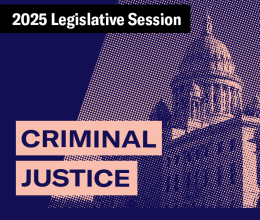We opposed legislation which seeks to expand the circumstances to require mandatory prison sentences for driving without a license. Currently, the statute makes it a misdemeanor for a person to drive without a valid license, or on a suspended, revoked, or cancelled license if the loss of license was based on any one of five different reasons: operating under the influence; refusing to submit to a chemical test; reckless driving; operating a motor vehicle so as to endanger resulting in death; or having three moving violations in a one year period. If the person is caught driving with a suspended license for any of the first four reasons, the law goes further and currently imposes a mandatory prison sentence. This legislation seeks to now include a person whose suspended license was based on a new, fifth reason: three previous moving violations in a year.
As longtime advocates against mandatory prison sentences, we argued that mandatory sentences are not only contrary to current justice reinvestment reforms, they are also an ineffective, costly, and discredited approach to criminal justice. While these speeding violations and other moving violations are potentially dangerous, they simply do not directly demonstrate the direct type of severely hazardous driving that the other four grounds do. While the potential mandatory sentence for a first offense may be small -- a minimum of 10 days at the ACI -- that sentence is enough for a person to lose their job and face a host of other untoward consequences.


